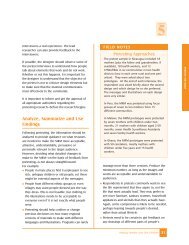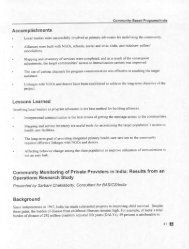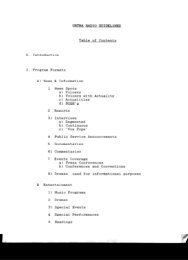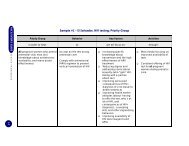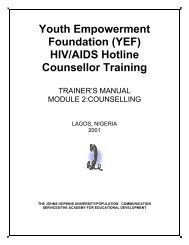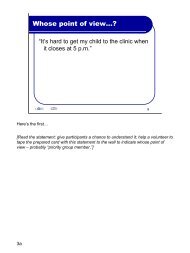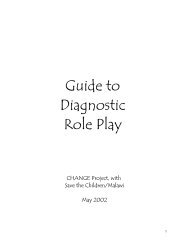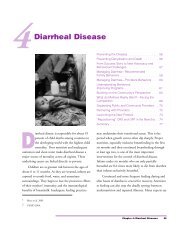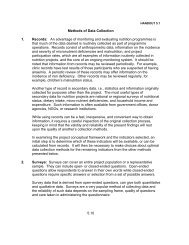MODULE TWO: COUNSELLING - FHI 360 Center for Global Health ...
MODULE TWO: COUNSELLING - FHI 360 Center for Global Health ...
MODULE TWO: COUNSELLING - FHI 360 Center for Global Health ...
You also want an ePaper? Increase the reach of your titles
YUMPU automatically turns print PDFs into web optimized ePapers that Google loves.
A woman who has been raped should see a doctor as soon as possible,<br />
especially if she wishes to press charges against her assailant. The doctor can<br />
make a report and gather evidence which could help to convict the rapist. It is<br />
also important <strong>for</strong> the woman to make sure that she has not been injured and<br />
that she receives treatment <strong>for</strong> sexually transmitted diseases. She should also<br />
receive an HIV test at least three months after the incident.<br />
•Domestic violence<br />
Battered women often are frightened and unaware of their alternatives. The first<br />
priority is to get them to a safe place. After that, the objective is to help<br />
empower them, not rescue them. It is important <strong>for</strong> a battered woman to learn<br />
to de-identify with a victim role, to see that she can have control and make<br />
decisions that directly affect her life. She must understand that battering<br />
behaviour is not acceptable under any circumstances.<br />
•Unemployment<br />
Short of offering someone meaningful employment, it's hard to help a person<br />
who is out of work. Feelings of anger, depression, humiliation, and self-blame<br />
are prevalent. Family members and friends can respect and acknowledge these<br />
feelings, however, providing valuable support. When a person is retrenched<br />
because of his/her HIV status, this is a case of discrimination, and YEF HIV/AIDS<br />
Hotline counsellors can refer him/her to legal resources. They can also refer<br />
callers to sources of financial assistance and employment resources if they are<br />
available.<br />
•Anger<br />
Defusing someone's anger starts with getting the person to recognise it <strong>for</strong> what<br />
it is. Anger frequently is denied, however, because it makes a person feel<br />
intolerably guilty. A counsellor can help someone recognise his/her anger by: 1)<br />
acknowledging that anger is a natural and understandable reaction to<br />
frustrations and restrictions; 2) helping the person identify the real source and<br />
target of his/her anger; and 3) helping the person identify the reason <strong>for</strong> being<br />
angry. Once this is done, it is possible to find a means of dealing with the anger<br />
realistically so that displaced anger, self-blame, and other inappropriate reactions<br />
are avoided.<br />
•Death of a loved one<br />
Guidelines <strong>for</strong> grief counselling will be discussed in detail in Session 10.<br />
Session 7- Pg. 9



